Pink Lady v the British apple
- Published
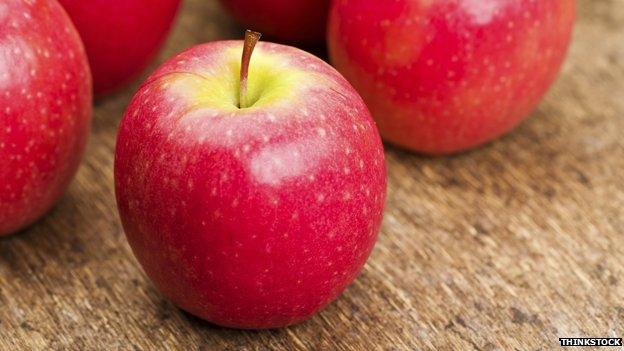
National Apple Day marks the height of the British season, but are home-grown varieties in danger from vigorously marketed foreign rivals like Pink Lady and Jazz, asks Sebastian Oake.
How many people will be popping down to the shops today for an old-fashioned apple? Maybe some Cox's Orange Pippin, Egremont Russet or Worcester Pearmain?
But you'll be lucky to find more than one or two traditional British varieties - those that were originally bred in the UK and are still grown on British soil. These are in danger of becoming dwindling heritage curiosities, ousted from both shops and orchards by new names.
Sales of Cox, Russet and Worcester have been falling year-on-year, while Gala and Braeburn have been rising. Gala, with its spin-off Royal Gala, is now the biggest-selling eating apple grown in the UK and total sales, including imports, are more than four times that of Cox. But it's an apple of New Zealand origin. Braeburn too was first grown in New Zealand but now has a foot in the door of British orchards.
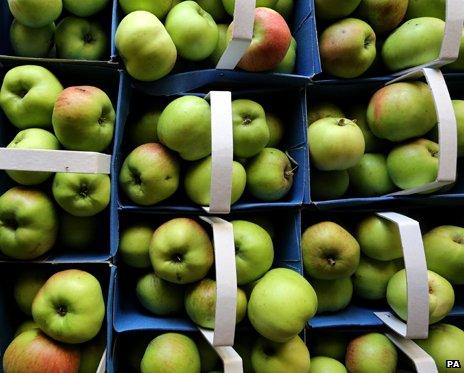
2013 has produced a bumper harvest season for English apples
And two more recently developed varieties from Down Under are set to complete the takeover of the market. Jazz is another New Zealand apple, produced in the 1980s by crossing Gala and Braeburn. Trial plantings began in England in 2002 with volume production achieved by 2007. Pink Lady was bred in Australia in 1973 as a cross between Lady Williams and Golden Delicious. It became available in British shops in the early 1990s.
Gala, Braeburn, Jazz and Pink Lady - the Antipodean Four - are now increasingly dominating apple shelves in the UK, but why?
Tastes are changing, says Adrian Barlow, chief executive of English Apples & Pears, a trade association for the industry. "People want sweeter apples, they want a crunchier texture and they want a good skin finish. That's why many new varieties have become successful."
English Apples & Pears represents the bulk of the commercial orchard acreage in England. Its members currently grow about 25 apple varieties. Of those just nine are what might be called "old English".
Barlow looks back to when the UK joined the Common Market in the 1970s. The door was opened to imports of Granny Smith and Golden Delicious, which took market share from Cox. Now these two are themselves in decline, victims also of the Antipodean Four.
Worldwide Fruit, a marketing and distribution company, controls the Jazz brand in the UK. Commercial director Steve Maxwell says: "There is definitely a long-term trend - the market for Cox is declining. Pink Lady and Jazz are consistent. Week in, week out, they always deliver on flavour."
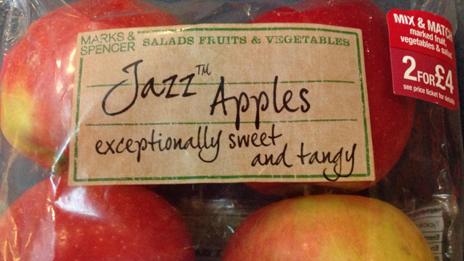
The shift towards Pink Lady and Jazz certainly isn't about price. Pink Lady can be anything up to twice the price of Cox. In Tesco last week, Braeburn was £1.95/kg, Cox £1.75/kg and Pink Lady £3.50/kg.
Some believe that lack of choice in supermarkets is behind the shift in tastes. Among those who are scathing is Common Ground, a charity that champions local distinctiveness. It set up National Apple Day in 1990.
"Supermarkets say they're responsive to consumer demand but I don't know how that operates," says Adrian Cooper, director of Common Ground. "If the range available in the shops is limited, then how do we express our demand? It's very difficult to know if the change in the market is due to changes in consumer taste or whether it's driven by a different force."
There's no doubt that some apples are more profitable to produce than others. A single Gala tree reportedly produces a higher yield than native English varieties and a much higher proportion of Gala fruit passes as Class I fruit than Cox. The apples are just the right size, shape and colour to get top price. Supermarkets rarely sell Class II.
There's little question too that in today's all-year-round market, supermarkets prefer not to fiddle about. For them, it's easier to place a contract with a single distribution company able to supply the same apple whatever the time of year, using different growing regions around the world in rotation. Worldwide Fruit can supply Royal Gala, Braeburn, Jazz and Pink Lady, 12 months a year. By contrast, it can supply Worcester Pearmain only in September.
One huge factor in the snakes-and-ladders world of apples is the degree to which a variety is marketed and the muscle behind it. This is where Jazz and Pink Lady differ from many other varieties.
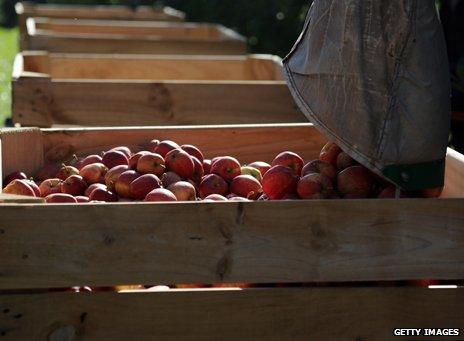
To be accurate, Jazz and Pink Lady are not apple varieties but commercial brands.
Jazz is the trademark brand name for the variety Scifresh. It was developed through a collaboration between Enza, formerly the New Zealand Apple and Pear Marketing Board, and Plant & Food Research, a New Zealand research institute, and can only be grown under licence. In the UK it is controlled by Worldwide Fruit, itself part owned by Enza.
Pink Lady is also a trademark - the actual variety is Cripps Pink. The brand is owned and licensed by Apple and Pear Australia. It is grown, with permission, in a range of countries but not in the UK. UK growers are not allowed to grow it because the trademark holder is worried the climate will not do it justice.
The effort put into pushing brands like Pink Lady is phenomenal. The apple has a website, Facebook page and Twitter account. Women dressed up as apples have been targeting people at London stations and there has been a tie-in with Great Ormond Street Hospital.
There is a logo for the apple, an official slogan ("so much more than an apple") and even the Pink Lady Club to sign up to. Through that you can access a chatroom, events and in-store promotions and, in a sign that much of the marketing is targeting children, the Pink Lady Club provides party packs (including the "Pink Lady apple song"), activity sheets and kids' recipes. Parents can even upload a picture of their child eating a Pink Lady apple to the Pink Lady website.
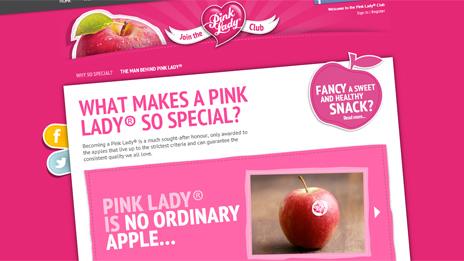
The Pink Lady brand is backed up by a sophisticated marketing campaign
In 2011 the people behind the Pink Lady brand promotion won an award from the Chartered Institute of Marketing. It's worth noting too that in all official material relating to the brand, the words Pink Lady come with an inseparable R in a circle reminding us all that this is Pink Lady® and someone's commercial property. Even the slogan "so much more than an apple" is trademarked.
It all sounds a world away, and perhaps it is, from the classic image of an old English orchard.
Follow @BBCNewsMagazine, external on Twitter and on Facebook, external